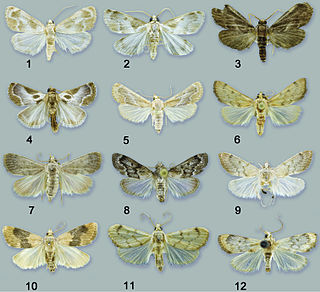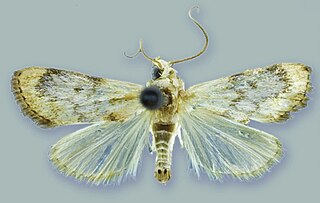
The Inter-American Division of Seventh-day Adventists is a sub-entity of the General Conference of Seventh-day Adventists, which oversees the Church's work in Mexico, Central America, the Caribbean, and Northern South America.

Pimenta is a genus of flowering plants in the myrtle family, Myrtaceae described as a genus in 1821. It is native to Central and South America, Mexico, and the West Indies.

The track and field competition in the 1998 Central American and Caribbean Games was held in Maracaibo, Venezuela.

The Athletics competition at the 1987 Pan American Games was held in Indianapolis, United States. The events were competed at the IU Indianapolis Track and Soccer Stadium.

Schacontia is a genus of moths of the family Crambidae described by Harrison Gray Dyar Jr. in 1914.

Schacontia medalba is a moth of the family Crambidae described by William Schaus in 1904. It is found in Brazil and Peru.

Schacontia chanesalis is a moth of the family Crambidae described by Herbert Druce in 1899. It is found in Mexico, Guatemala, Costa Rica and Venezuela.

Schacontia umbra is a moth of the family Crambidae described by Maria Alma Solis and Paul Z. Goldstein in 2013. It is found in central Ecuador.

Schacontia speciosa is a moth of the family Crambidae described by Maria Alma Solis and Paul Z. Goldstein in 2013. It is found in south-eastern Brazil.

Schacontia rasa is a moth of the family Crambidae described by Maria Alma Solis and Paul Z. Goldstein in 2013. It is found in Mexico, Cuba and the Dominican Republic.

Schacontia nyx is a moth of the family Crambidae described by Maria Alma Solis and Paul Z. Goldstein in 2013. It is found in northern Venezuela.

Schacontia lachesis is a moth of the family Crambidae described by Maria Alma Solis and Paul Z. Goldstein in 2013. It is found in central Brazil and Bolivia.

Schacontia atropos is a moth of the family Crambidae described by Maria Alma Solis and Paul Z. Goldstein. It is found in northern Venezuela.

Schacontia ysticalis is a moth of the family Crambidae described by Harrison Gray Dyar Jr. in 1925. It is found in Mexico, Costa Rica, Honduras, Nicaragua, Venezuela and Bolivia.
Diaphania elegans is a moth in the family Crambidae. It was described by Heinrich Benno Möschler in 1890. It is found in Puerto Rico, Hispaniola, Jamaica, Cuba, Costa Rica, Panama, Guatemala, Honduras, Mexico and southern Texas. It is also found in South America, where it has been recorded from Venezuela, Trinidad, Ecuador, Peru, Brazil, Paraguay and Argentina.
Neoleucinodes prophetica, the potato tree borer, is a moth in the family Crambidae. It was described by Harrison Gray Dyar Jr. in 1914. It is found in Puerto Rico, Cuba, Jamaica, the Dominican Republic, Guatemala, Costa Rica, Panama, Honduras, Peru, Venezuela, Colombia, Trinidad and Tobago and Brazil. It is also present in southern Florida.

The 2023 FIBA Basketball World Cup qualification for the FIBA Americas region began in April 2021 and concluded in February 2023. The process determined the seven teams that would participate at the 2023 FIBA Basketball World Cup.
The 2022 Pan American Cross Country Cup took place on March 27, 2022, in Serra, Brazil.















